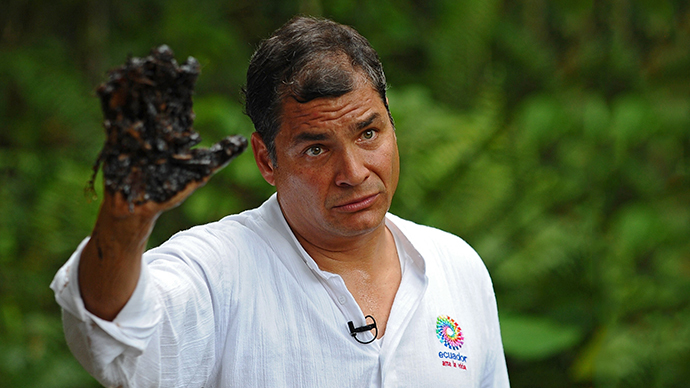
Authorities in Russia’s Omsk region in Siberia have prohibited
Halloween celebrations in local schools on the grounds it “promotes
extremism” and a “death cult” that can harm the moral health of
children.
The Education Ministry in the Omsk region sent letters to local state schools telling them to take measures to curb any events marking Halloween, which is celebrated on October 31, the eve of All Hallows’ Day.
The move is aimed at the prevention of the development of extremism among children and young people, the ministry said in a statement. The decision followed an appeal from a public organization called “Omsk Parents’ Council”.
Educational institutions must carry out activities “based on cultural values of Russian people,” believes the regional Education Minister, Sergey Alekseyev, the body quotes. He said the ministry will improve “methodological support” in the organization of students’ leisure activities. Also, plans are afoot to impose tougher controls over the planning of celebrations in schools.
The ministry cites studies by two institutes affiliated with the Russian Academy of Education, which found that celebrating Halloween has a negative impact on students as well as the teaching process. Because of “elements of mystics” and the “propaganda of death cult” in the celebrations, they can lead to “devastating consequences for the spiritual and moral health of students,” experts stated.
The ministry provides no information about the names of the authors of the research, or the title of the study, conducted by the institutes which are not among Russia’s top establishments.
Moscow schools will not celebrate Halloween either, according to newsru.com. Even though the capital’s authorities have given no instructions on the matter this year, local schools are following directives issued by Moscow’s Education Department several years ago. It recommended refraining from having any kind of festive activities on this day.
 Authorities in the Krasnodar region in southern Russia also think
that local school children should not take part in the
celebrations, reported the local eparchy website, citing the
regional education minister. Events were banned last year and the
ban remains in place.
Authorities in the Krasnodar region in southern Russia also think
that local school children should not take part in the
celebrations, reported the local eparchy website, citing the
regional education minister. Events were banned last year and the
ban remains in place.
“According to many scientists – psychologists and psychiatrists – Halloween is dangerous for children. Children who have taken part in such events often feel fear, depression, aggression and a suicidal mood,” the Ekaterinodar and Kuban Eparchy quotes a letter by the ministry.
Halloween, which has its origins in an ancient Celtic festival, for decades has been celebrated in North America, but has also gained popularity among Russian youth in recent years. While some see the holiday as just a masquerade and a way to have fun, opponents consider such an “alien” festival as a threat to Russian traditional culture.
“One would think what’s wrong about this pumpkin with holes? But in fact it is simply hidden Satanism,” a priest from Vladivostok, Father Tikhon told RIA Novosti. He urged everyone to hold back from Halloween, “to run away from it”.
Senior Orthodox Church official Archpriest, Vsevolod Chaplin, has also warned against joining the festivities. “Dark forces” often try to make a person believe that they do not exist and “kind of play with them”.
“But evil spirits always wins in their games. So, in reality it only seems to people that [this game] is only a fun and a harmless gag,” the cleric said. “Dark forces think otherwise and will definitely ‘make fun’ of you so that you won’t be happy about that at all.”
Organizers of Halloween events totally disagree, saying that the festival – which has both historic and religious roots – has now turned into a fancy dress party.
“Youth all over the world actively celebrate this holiday. Many say that it’s their favorite one after the New Year,” an organizer of a Halloween party at one of Moscow’s cinemas, Elena Preobrazhenskaya, told Mir24.tv. She said they had their party earlier this week, but it appeared to be so popular that it was decided to hold another one, as well as a separate party for children.
“A fancy ball gives you an opportunity to think of a carnival image, a costume, unusual make-up and have fun,” Preobrazhenskaya said.
Children love Halloween a lot more than adults, “they are not interested in just watching from sidelines, they want to participate,” in this “bright and unusual festival” that is growing in popularity.
The Education Ministry in the Omsk region sent letters to local state schools telling them to take measures to curb any events marking Halloween, which is celebrated on October 31, the eve of All Hallows’ Day.
The move is aimed at the prevention of the development of extremism among children and young people, the ministry said in a statement. The decision followed an appeal from a public organization called “Omsk Parents’ Council”.
Educational institutions must carry out activities “based on cultural values of Russian people,” believes the regional Education Minister, Sergey Alekseyev, the body quotes. He said the ministry will improve “methodological support” in the organization of students’ leisure activities. Also, plans are afoot to impose tougher controls over the planning of celebrations in schools.
The ministry cites studies by two institutes affiliated with the Russian Academy of Education, which found that celebrating Halloween has a negative impact on students as well as the teaching process. Because of “elements of mystics” and the “propaganda of death cult” in the celebrations, they can lead to “devastating consequences for the spiritual and moral health of students,” experts stated.
The ministry provides no information about the names of the authors of the research, or the title of the study, conducted by the institutes which are not among Russia’s top establishments.
Moscow schools will not celebrate Halloween either, according to newsru.com. Even though the capital’s authorities have given no instructions on the matter this year, local schools are following directives issued by Moscow’s Education Department several years ago. It recommended refraining from having any kind of festive activities on this day.

“According to many scientists – psychologists and psychiatrists – Halloween is dangerous for children. Children who have taken part in such events often feel fear, depression, aggression and a suicidal mood,” the Ekaterinodar and Kuban Eparchy quotes a letter by the ministry.
Halloween, which has its origins in an ancient Celtic festival, for decades has been celebrated in North America, but has also gained popularity among Russian youth in recent years. While some see the holiday as just a masquerade and a way to have fun, opponents consider such an “alien” festival as a threat to Russian traditional culture.
“One would think what’s wrong about this pumpkin with holes? But in fact it is simply hidden Satanism,” a priest from Vladivostok, Father Tikhon told RIA Novosti. He urged everyone to hold back from Halloween, “to run away from it”.
Senior Orthodox Church official Archpriest, Vsevolod Chaplin, has also warned against joining the festivities. “Dark forces” often try to make a person believe that they do not exist and “kind of play with them”.
“But evil spirits always wins in their games. So, in reality it only seems to people that [this game] is only a fun and a harmless gag,” the cleric said. “Dark forces think otherwise and will definitely ‘make fun’ of you so that you won’t be happy about that at all.”
Organizers of Halloween events totally disagree, saying that the festival – which has both historic and religious roots – has now turned into a fancy dress party.
“Youth all over the world actively celebrate this holiday. Many say that it’s their favorite one after the New Year,” an organizer of a Halloween party at one of Moscow’s cinemas, Elena Preobrazhenskaya, told Mir24.tv. She said they had their party earlier this week, but it appeared to be so popular that it was decided to hold another one, as well as a separate party for children.
“A fancy ball gives you an opportunity to think of a carnival image, a costume, unusual make-up and have fun,” Preobrazhenskaya said.
Children love Halloween a lot more than adults, “they are not interested in just watching from sidelines, they want to participate,” in this “bright and unusual festival” that is growing in popularity.




